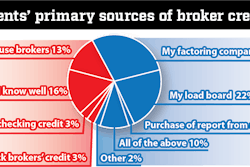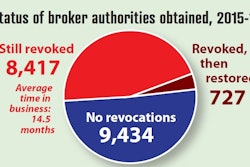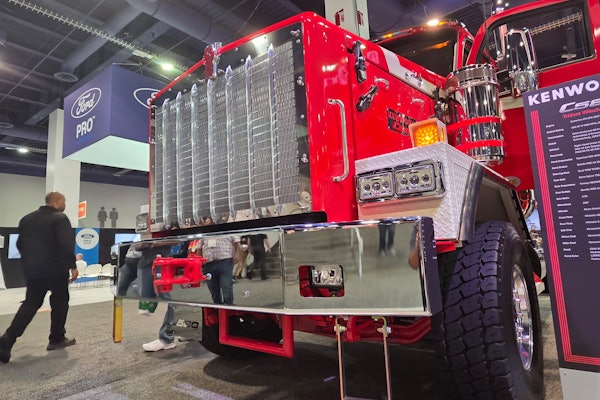If you've found this story, know that you're not the first carrier to have found yourself unpaid for loads hauled for a broker or freight forwarder that has gone broke or, in other cases, had no intention to pay to begin with. Sometimes, it's possible to still receive all or a portion of the unpaid freight bill from other parties responsible for payment.
1. What is the difference between a freight broker and a freight forwarder?
Both must be registered with the Federal Motor Carrier Safety Administration. While they often operate in similar ways, their legal responsibilities differ. A broker serves as an intermediary between the shipper or receiver and the motor carrier hauling the load. A broker is not liable for loss or damage to the freight and thus most often does not carry cargo insurance.
A freight forwarder, in its relationship with a shipper or receiver, is a carrier. Unlike a broker, a forwarder is responsible for loss or damage to the freight. In its relationship with a carrier, a freight forwarder has the status of a shipper. Think of a freight forwarder as a carrier without trucks or trailers.
The significance of this legal distinction is that a carrier hauling a load may look only to the shipper or receiver for payment. If the freight forwarder goes broke, the underlying motor carrier may not look to the freight forwarder's customer for payment.

[Related: Carriers' right to review what the shipper paid for a brokered load]
2. Can I look to a broker's customer for payment?
Sometimes. If the broker was acting as the agent of the shipper or receiver, then you may recover payment from either a shipper or receiver. However, proving that agency relationship existed depends on certain facts.
Courts will look at the degree to which the shipper delegated its shipping responsibilities to the broker. If the broker was effectively acting as the transportation department for the shipper, then there is a good chance of having a court find the shipper liable for the unpaid freight bill.
3. What is the significance of a bill of lading contract and a master hauling contract in determining whether a shipper or receiver is liable for a freight bill’s payment?
Smart brokers draft their master hauling contracts with carriers to state that "the carrier agrees to look only to the broker for payment of freight bills," or words to that effect. Under a provision such as this, a carrier may not look to the shipper or receiver for payment.
A bill of lading is a contract of transportation. If you are the carrier, make sure your name is shown as such on the bill of lading. It can establish your legal entitlement to payment from the shipper unless you have agreed to look only to the broker for payment.
 The carrier should ensure its name is shown on the bill of lading to help establish entitlement to payment from the shipper in the event of a problem with the broker.
The carrier should ensure its name is shown on the bill of lading to help establish entitlement to payment from the shipper in the event of a problem with the broker.
4. What is Section 7 of a Uniform Bill of Lading?
Shippers usually use a short form bill of lading that incorporates by reference terms of the long form Uniform Bill of Lading, published by the National Motor Freight Traffic Association. Section 7 of the long form provides that when the "non-recourse" provision on the face of the short form version is signed, then the shipper is not liable for payment of the freight charge. Instead, the payment obligation is transferred to the receiver or some other responsible party. Smart shippers sign the non-recourse provision of the bill of lading when using brokers.
5. When is the broker's bonding company or trust fund liable for payment?
Both brokers and freight forwarders must provide FMCSA with proof of insurance in the form of a surety bond or trust fund ensuring payment of freight bills up to $75,000. The name of the broker’s or forwarder’s bonding or trust fund company can be found within FMCSA's SAFER Database. A claim against the bond or trust fund can be made by mail, or in many cases electronically, with documentation that the load was delivered and the freight bill remains unpaid.
If other carriers are similarly owed and claims exceed $75,000, the bond or trust fund company will often pay the money into a state court, discharging its payment obligations. The bond or trust fund company also files a complaint that lists the claimants and says, essentially, “We don’t know whom to pay.” Claimants can then file with the court, which determines how the funds will be divided.
[Related: How to file against a broker's bond, and other collection-related resources]
6. Am I entitled to payment from the defunct broker's bank?
Brokers often pledge their receivables to a bank as loan collateral. Other brokers sell their receivables to a factoring company that ends up owning the receivables. A bank or factoring company can acquire only the interest that the broker had. At least one federal appellate court has held that a bank to which a broker has pledged its receivables holds only lien on the broker's portion of the receivable.
In other words, the bank or factoring company may well have been holding the money the broker owes you and you may be entitled to recover it. However, getting that payment is likely to require a civil court action against the bank or factor.
Paul Taylor is managing partner of Truckers Justice Center and has represented truck drivers for over 25 years. He can be reached at 855-943-3518 or via the Truckers Justice Center website.











